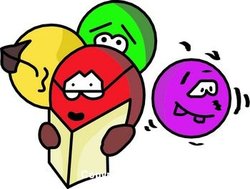Science fair
|
|
| Contents |
Overview
Science fairs usually are involved with children and schooling, however, the term can be used to describe science fairs independent of the age of the contestants involved. They are often also combined with competition in mathematics or history.
In the United States, the largest annually held science fair is the Intel International Science and Engineering Fair (http://www.sciserv.org/isef/) (ISEF). Corporations and organizations often sponsor or host science fairs, many of which offer scholarships as prizes. While these events are used mainly for public relations, many of the sponsoring companies do require a "first right of refusal" clause, allowing them to shop for new and innovative ideas. However, Intel does not make any such requirement in the ISEF. According to Science Service (http://www.sciserv.org/), which has organized the ISEF since 1950, in addition to the approximately $3 million in scholarships, tuition grants, scientific equipment, and scientific trips awarded annually at ISEF, ten to fifteen percent of finalists usually file for patents on their projects.
In Europe, there are national science fairs in most countries, such as the Esat Young Scientist and Technology Exhibition in Ireland or Jugend forscht in Germany. On an international level, the European Union also sponsors the European Union Contest for Young Scientists which is held in a different country every year. Partipants come from the European Union and associated countries, such as Norway, Switzerland, the United States, Russia, and China.
History
In the United States, science fairs first became popular in the early 1950s, with the ISEF, then known as the National Science Fair. Interest in the sciences was at a new high after the world witnessed the use of the first two atomic weapons and the dawn of television. As the decade progressed, science stories in the news, such as Jonas Salk?s vaccine for polio and the launch of Sputnik, brought science fiction to reality and attracted increasing numbers of students to fairs.
Criticism
Some people have pointed to primary school experience as one factor which may actually discourage students from taking further interest in the sciences. [1] (http://www.csun.edu/~lg48405/vsf/ch1/ch1_wha.html) They claim that traditional science fairs, as well as programs like the Westinghouse Science Honors Institute, place too much focus on competition, a charge which science fair supporters answer by pointing to the real life competitive nature of awarding scientific grants and even the Nobel Prize.
List of science fairs
International
National
Canada
- Youth Science Foundation Canada (http://www.ysf.ca/)
- Canada-Wide Science Fair
Ireland
Science Fair Ideas
See also
External links
- The Society for Amateur Scientists' resource page for science fairs (http://www.scifair.org/)
- Discovery Channel's science fair page (http://school.discovery.com/sciencefaircentral/)
- A Science Fair Companion (http://www.ericdigests.org/2000-1/companion.html)
- Hundreds of sample science fair projects with complete instructions and detailed explanations (http://www.all-science-fair-projects.com)


